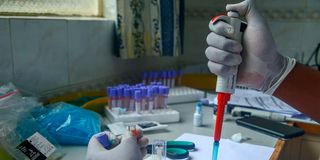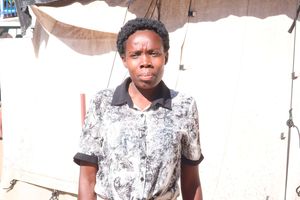Why couples should consider screening for genetic disorders before getting married

Common genetic disorders in Kenya include sickle cell disease, haemophilia, thalassemia, congenital disorders, heritable cancer syndromes and hereditary dementias.
What you need to know:
- Countries such as Saudi Arabia, Bahrain and the United Arab Emirates, which have high rates of inherited disorders, have led the way by mandating sickle cell testing before marriage, aiming to reduce the prevalence of these conditions and support informed family planning.
Patrick Mutune* (name changed) had a date. He arrived at the restaurant just as the music shifted to slow, soulful Kizomba, drawing couples to the dance floor. He had hoped to get there early, settle in and catch his breath before his date arrived. He had even rehearsed a few clever lines, picturing her smile as she approached the table he had reserved.
“I had gotten ready early,” he explains, “but just as I was about to leave, this sudden heaviness took over my limbs. And then this sharp, biting pain hit—I had no choice but to sit down on the couch for nearly an hour just to pull myself together. That’s how she ended up getting there before me.”

Every year, roughly 14,000 people in Kenya are born with sickle cell disease—a hereditary blood disorder that reshapes soft, flexible red blood cells into rigid, crescent-like forms.
Patrick is one of the roughly 14,000 people in Kenya born each year with sickle cell disease—a hereditary blood disorder that reshapes soft, flexible red blood cells into rigid, crescent-like forms. This transformation disrupts blood flow, often causing painful blockages known as “crises” and severe complications across many major organs.
Living with sickle cell has affected nearly every corner of Peter’s life, shaping how he navigates everyday activities and future plans. But of all the challenges it has brought, it’s his love life that has suffered the most, as he faces both the limitations of his condition and the stigma that surrounds it.
“It’s easy to explain why it took me more than six years to finish my undergraduate degree, getting to work late, or why I am still living in my mother’s house in my thirties,” he admits.
“But when it comes to why I’m single, I stumble. People out there worry about height, weight or skin tone. I worry about my genetics.”
Chapter 2
Growing up, Patrick was always aware that something was off, though he couldn’t fully grasp it—nor could his parents. “The only hint that something was wrong was my sister, who kept getting sick,” he recalls. “But I was very young. We lost her when I was barely seven. In retrospect, my father often complained of being unwell too, although not as much as my sister. He died in 2020.”
After finishing his undergraduate studies, Patrick volunteered as a primary school teacher, and it was there that he finally began to understand his condition. “I started dating this girl,” he says. “Early on, she mentioned she was a sickler. When she described her symptoms, it hit me.I knew, at that moment, that I had it, too. The relationship didn’t last, but what I learned from her changed my life forever.”
**
As he took his seat that evening, his date glanced at the couples on the dance floor and requested a dance. “We had been sharing about our liking for music and for the particular song that was playing so it wasn’t atypical of her to ask but I couldn’t because I was still tired,” he says.
He blurted out that he had sickle cell disease. “She didn’t reference it that evening but she was very understanding and we went on to engage in other things. Later, we parted ways amicably and that was that. That evening was in November 2022 and I have been single since. I have been focusing on fully understanding and accepting my condition. It’s not easy knowing that sickle cell will always be part of my story, especially in dating. For now, I want to be sure of where I stand with it before I try to share that part of myself with someone else,” he offers.
For decades, love and romance were free from the scrutiny of science; couples rarely had to consider their genetic compatibility before marriage. That began to change with the rise of the HIV epidemic, which reshaped relationships and expectations worldwide. As HIV spread, couples were encouraged—and sometimes required—to undergo HIV testing to protect each other’s health. In Kenya, for example, a premarital HIV test is mandatory for couples planning a church wedding.
Now, with genetic conditions like sickle cell disease placing increasing pressure on health systems, many countries are rethinking premarital health requirements. Countries such as Saudi Arabia, Bahrain and the United Arab Emirates (UAE), which have high rates of inherited disorders, have led the way by mandating sickle cell testing before marriage, aiming to reduce the prevalence of these conditions and support informed family planning.
The genetic testing in UAE, for instance, aims at detecting more than 570 genetic mutations linked to hereditary diseases, including cardiomyopathy, genetic epilepsy, spinal muscular atrophy, hearing loss, cystic fibrosis, and other severe and chronic conditions that are challenging to treat.
The UAE government said the initiative aims to ensure “that those about to get married are free from any genetic mutations that could be passed on to their children.”

Dr Syokau Ilovi is a clinical geneticist. She notes that genetic disorders result from abnormalities in an individual’s DNA composition.
In West Africa, where sickle cell disease is more common, countries like Ghana and Nigeria have also introduced premarital sickle cell testing as a preventive measure.
Uganda, which has one of the highest rates of sickle cell disease in East Africa, is now looking to enact a law that would see all intending couples first undergo sickle cell testing and counselling before tying the knot.
“As we talk about care, early screening and treatment of sickle cell warriors, we must talk about pre-marital testing and counselling…we can fall in love, yes, but our mistakes as parents are causing pain to our children,” Dr Diana Atwine, the Permanent Secretary at the Ministry of Health in Uganda told a local publication.
Chapter 3
At the Baraka health clinic in Mathare Valley slums, Dr Moses Odongo who works for the German Doctors, an organisation that offers medical aid to slum dwellers, diagnoses at least three new cases of sickle cell disease.
A while back, we surveyed the actual cost for a patient for a single visit. Forget about when they have painful crises, but a patient who is coming in for a routine check. From consultation and routine lab tests to the support group or the pharmacy, we realised that the average amount spent on one patient per visit averaged Sh4,000. Children under the age of five, who make up the highest demographic for sickle cell patients in Mathare, receive treatment for free. It means that someone is funding the services on behalf of the patients. Imagine a situation where there is no funding,” he remarks.
Experts say the need for sustained support isn’t just about managing costs; it’s also about breaking the cycle of new cases. “A recent mapping we did in Mathare alone shows that it has at least 800 sickle cell patients, and a new trend is that we are seeing patients from all regions not just from areas like the Coast, Western or Nyanza where it was once endemic,” offers Dr Ondongo.
Although there are hundreds of diseases that parents carrying certain genetic mutations might pass on to their children, sickle cell disease is one of the most common archetypes of genetic testing and counselling. So much so that themes of awareness days such as “Let’s Break the Chain,” directly call for premarital gene testing and counselling to help prevent future generations from inheriting the disease.
“The risk of having a child with sickle cell disease depends entirely on the genetic make-up, or genotypes of both parents. If both parents have normal haemoglobin (AA), all of their children will also have normal haemoglobin, meaning there’s no risk of sickle cell disease. When one parent is normal (AA) and the other is a carrier (AS), each child has a 50 per cent chance of being a carrier (AS) and a 50 per cent chance of being normal (AA), so there is no risk of the child having sickle cell disease, though they may inherit the carrier trait,” he says.
If both parents are carriers (AS), however, there is a 25 per cent chance of having a child with sickle cell disease (SS), a 50 per cent chance of having a child who is a carrier, and a 25 per cent chance of having a child who is normal (AA). For couples where one parent is a carrier and the other has sickle cell disease, each child has a 50 per cent chance of inheriting sickle cell disease and a 50 chance of being a carrier.
“Finally, when both parents have sickle cell disease, all children will inherit sickle cell disease, as each child will receive sickle cell genes from both parents,” explains Dr Odongo.
The cost for testing varies, with Dr Odongo explaining that it could range from Sh1,500 to Sh10,000 depending on the method and where one chooses to do it.
“There is a lot that is being done, but there is still reluctance due to lack of awareness. And, this is what we are doing. We encourage couples to get tested but also advocate for strong public health systems that can offer these tests either for free or at subsidised costs.
For couples who turn out to be carriers, there is no final verdict. “We don’t dictate a specific course of action because our work is not to tear lovers apart, but our work will be to inform them that there is a probability they might have a child with sickle cell. Therefore, when they retreat on their own time, then they ask themselves this tough question, “what should we do? We have been counselled, we have been advised,..it’s up to the two of us to make an informed decision.”
Dr Samson Gwer, a pediatric neurologist, explains that most genetic conditions are classified as recessive. “This means that a person must inherit two copies of the abnormal gene—one from each parent—to actually develop the disease.
For Spinal Muscular Atrophy (SMA), these are rare diseases and the carrier rate is one in 10,000, which means one out of every 10,000 humans has the carrier gene. Now, the randomness of life is that there are chances of meeting a spouse who is a carrier and there is a one in four chances of having a child who has the disease,” he explains.
A few genetic conditions, however, are dominant, which means that inheriting just one copy of the abnormal gene—either from the mother or the father—is enough to cause the disease. Multiple studies show that anyone who has the dominant gene will show symptoms of the condition, so there are no silent carriers as there are with recessive conditions.
Because the disease manifests with just one copy of the gene, individuals with a dominant gene for a condition like Huntington’s disease or Marfan syndrome, will experience symptoms. They can pass the condition to their children with a 50 per cent chance in each pregnancy, but since there are no carriers, their children will either inherit the disease or remain completely unaffected.
Dr Gwer explains that relationships often begin without any consideration of genetic makeup—people meet and fall in love naturally, as it should be. “That’s life,” he notes. “But one reason we’re generally discouraged from marrying relatives is the higher chance that shared genes, especially recessive ones, could align, increasing the risk of passing on certain genetic conditions.”
He points out that genetic testing before having children falls into the realm of reproductive genetics, a personal choice for couples to consider, especially in regions where certain diseases are highly prevalent. “In communities where conditions like sickle cell disease are common, it’s worth considering genetic testing if you’re marrying within the same community. But otherwise, it’s difficult to suggest blanket genetic profiling before choosing a spouse, given how spontaneous and random life is.”
The neurologist also emphasises that not all genetic conditions are inherited directly through family lines. “Sometimes, genetic variants or anomalies can start with you a result of spontaneous mutation rather than family history. Unfortunately, it’s often just bad luck when these things happen,” he reflects.
A 2022 case study in Indonesia reported that a combination of in vitro fertilization (IVF) and preimplantation genetic testing enabled a couple—both carriers of mutations causing SMA—to welcome a healthy newborn. The approach allowed them to screen and select embryos free from the SMA-causing mutation, making it possible for them to have a child unaffected by the condition.
“Through IVF, specialists can screen embryos and select only those without the aberrant SMA gene. By utilising only the egg and sperm free of this gene, there’s a higher chance of conceiving a child unaffected by the condition,” he says.
However, Dr Gwer notes that this path requires a multidisciplinary approach, with geneticists, IVF specialists, embryologists and supporting institutions working closely together to ensure the process is managed with precision and care.
“Even when specific genes like the SMA variant aren't targeted for selection, IVF itself presents challenges. Awareness of these challenges is essential for couples considering this option,” he notes, explaining that, while IVF can offer a route around genetic risks, it is not without its complexities. Genetic counselling, in this way, equips couples with a full view of their choices, risks, and realities as they consider their options for family planning," he offers.
Inherited disorders explained
Dr Syokau Ilovi, a clinical geneticist, notes that genetic disorders result from abnormalities in an individual’s DNA composition. These DNA abnormalities may be inherited from one or both parents or may develop for the first time in the offspring. There are over 8,000 known genetic disorders; affecting all organ systems and can present for the first time in childhood, adulthood or in the elderly. Common genetic disorders in Kenya include sickle cell disease, haemophilia, thalassemia, congenital disorders, heritable cancer syndromes and hereditary dementias.
Because they affect the DNA, genetic disorders are lifelong conditions that may be managed symptomatically or cured with gene therapies. Gene therapies are very expensive; sickle cell gene therapy costs Sh280 million; whereas spinal muscular atrophy is Sh300 million for one patient. Therefore, most people with genetic disorders will be managed for the symptoms that arise for the duration of their lifetime. Prevention of genetic diseases therefore becomes an important strategy to reduce the number of people with genetic disorders in the community.
Genetic disorders that require inheritance of the mutation from both parents are known as autosomal recessive disorders and include sickle cell disease, thalassemia, albinism and spinal muscular atrophy (SMA). Premarital screening for autosomal recessive genetic disorders is undertaken to assess the risk of a couple both having the mutation and passing it to their offspring; the couple can then decide whether or not to proceed with the union. The UAE is currently screening all prospective couples for over 800 genetic disorders in a bid reduce genetic disorders in their population. In Kenya, a study we undertook this year to evaluate the acceptability of premarital screening among the unmarried found that 62 per cent of the respondents were willing to be tested. Premarital screening is advocated for genetic disorders that are common within our population such as sickle cell disease and thalassemia. We also recommend testing for blood relatives of a child or adult who has been diagnosed with a genetic disorder.
Testing allows people to understand their genetic risk and that of their offspring. Genetic testing of family members is now possible for most genetic disorders, although the cost remains high and are largely not covered by insurance.
Due to their heritable nature, parents and relatives of persons with genetic disorder are plagued with guilt and worry of recurrence in a subsequent pregnancy. Genetic counselling and testing allows families to fully understand the genetic disorder and treatment options in affected person, prevention strategies and early screening protocols for other family members. We encourage families with genetic disorders to seek genetic services to improve the clinical outcomes.





